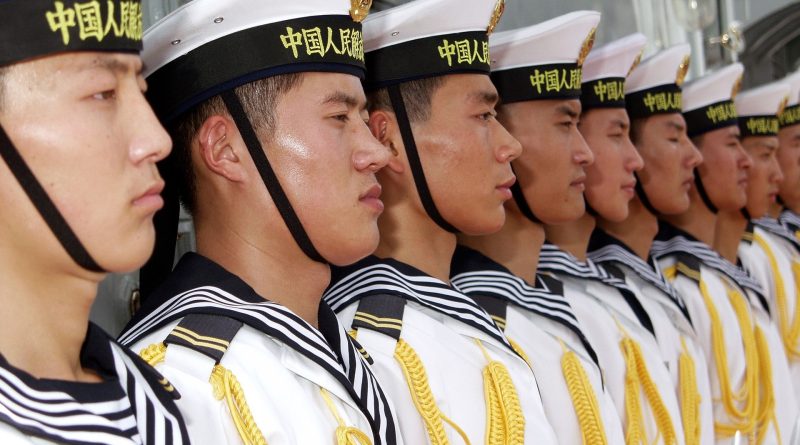Will China attack the US setting off World War III?
The People’s Republic of China (PRC) might be setting the stage for a war with the U.S., and if that is so, what would such a war look like? Would it include ground troops? Cyber attacks? Or would it be an economic war fueled by trade disputes? Who would win in each scenario? Is conflict inevitable? Or can it be avoided?
Rising tensions
Earlier this year, PRC spy balloons breached U.S. airspace. One of the balloons was shot down off the coast of South Carolina. Another flew chillingly close to an air force base in Montana that houses hundreds of nuclear missiles. That same balloon went on to fly over other highly sensitive military sites. The Pentagon opted against shooting it down, downplaying its intelligence capabilities and citing the risk of excessive debris contaminating nearby farms.
China has been stealing U.S. military technology for decades and has an extensive and sophisticated spy network. China has even attempted to influence U.S. political campaigns. PRC spies are believed to pose as diplomats, students, and cultural guides.
The communist nation of 1.4 billion, the most populated on earth, has unlimited manpower. It is a global economic power with a growing middle class that has a considerable appetite for Western products.
Yet more than 30 years after the Tiananmen Square massacre, China’s human rights record still is disconcerting, according to a recent report by the U.S. Department of State. People are routinely imprisoned and/or sent to re-education camps for speaking out against the regime or for belonging to religious groups that the regime considers to be a threat to its power.
There are no truly independent entities in China. Everything is tied to Beijing and the Communist Party. That includes all businesses, media, and cultural and entertainment operations.
China’s recent military drills off the coast of Taiwan, a nation that the U.S. has pledged to defend in the event of an invasion, makes the situation even more chilling, as a potential nuclear showdown between Chinese and American forces could be the first step on the road to armageddon.

“The Chinese government needs to be held accountable when it violates international norms, whether it’s related to human rights abuses, economic coercion, or provocative military maneuvers,” Sen. Chris Van Hollen (D-Md.) told Baltimore Post-Examiner.
Van Hollen sits on the Senate Foreign Relations Committee and has sponsored several bipartisan bills aimed at holding China accountable for malicious acts.
“While we’re taking important steps to invest in innovation, technology, and education to strengthen our economic competitiveness here at home, we must also continue to work with our partners around the world to counter China’s malign actions.”
What would a war with China look like?
“A war between the United States and China would be the single worst event in human history for a single reason: it would likely involve nuclear weapons,” said Harry Kazianis, President of Rogue States Project.
“While there are countless variables one would have to consider, the challenge is both sides would be incentivized to strike hard and fast to destroy the other’s vast conventional military capabilities. China, for example, has built a military that is built around thousands of missiles that would be used in a surprise attack to destroy U.S. bases, airpower, and naval assets all over the Pacific. That would press Washington to consider a massive response in kind, and that could even mean nuclear weapons,” Kazianis added.
And it is not totally inconceivable that tensions between the U.S. and China could soon come to a breaking point, Kazianis said.
“What makes this all scary is there are so many pressure points: Taiwan, the South China Sea, trade, intellectual property theft, North Korea, and so on, that a war is possible now. And that should terrify us all.”
How can war be prevented?

(Twitter)
“A lot of what we have to do with our strategy with China is stay ahead of them. And let them know that we have the technology to protect ourselves and to protect our allies,” Rep. Dutch Ruppersberger (D-Md.) said. “And China understands that.”
Ruppersberger served as the top Democrat on the House Intelligence Committee from 2011-15 and now sits on the House Committee on Appropriations Defense subcommittee. He said the U.S. must remain vigilant in order to prevent China from becoming the most powerful nation on earth.
“China is not where we are in a lot of areas. But they are ahead of us in some areas. And where they are ahead of us is in their investments in space, and areas like that. They have to be reckoned with. They are a country that is trying to eventually take over the world. They are patient. It makes no difference to them whether they do something now or four years from now. Whenever they feel it is the right time…I believe that strength protects us.”
Former Rep. Curt Weldon, a Pennsylvania Republican, said the U.S. could more effectively deal with threats posed by China if career bureaucrats in the State Department and in national security positions were relieved of service.
“The U.S. needs to ‘clean house’ of those who have dominated both parties since the 90’s in sending the wrong signals to our adversaries that money can overcome any challenges and accomplish any objective.”
Weldon served on the Select Committee on U.S. National Security and Military/Commercial Concerns with the People’s Republic of China, more commonly known as the “Cox Committee.”
In 1999, the committee released a bipartisan report that documented Chinese theft of U.S. nuclear weapons technology and related communications systems dating back to the 1970s. The report made recommendations to the Clinton administration on how to better safeguard sensitive national security sites and information.
“Simultaneously, the White House, Congress, and the private sector need to immediately and aggressively engage with Chinese counterparts in pursuit of comprehensive, transparent, and fair short and long-term strategic plans for collaboration and peaceful coexistence.”
Weldon said the outlook for U.S.-China relations appears “dismal” at the moment.
“China’s technology capabilities are now recognized and understood to be impressive–and extremely dangerous -especially to Taiwan. During my 20-year tenure in Congress, as the Vice Chair of the Armed Services and Homeland Security Committees, I organized and chaired the first comprehensive hearings on EMP (Electro Magnetic Pulse), technology developed by the U.S. and the USSR in the 1960s. My fear is that China will launch an EMP against Taiwan that will ‘dumb down’ all systems in the country including those of the Taiwan military allowing China to move quickly with little to no resistance.”
How powerful are China’s missiles?

“They have leap-frogged over us now because they have a hypersonic missile-an offensive missile. And we have no hypersonic offensive missiles, nor a hypersonic missile defense system,” Rep. Andy Harris (R-Md.), who sits on the House Committee on Appropriations Homeland Security subcommittee, said.
Harris said Chinese spy attempts must not be tolerated.
“We just have to get serious about China being both an economic and military enemy. And treat them as such. You do not want an enemy surveillance system anywhere over your country. I think we have to make it clear to them that we will not tolerate a Chinese surveillance system anywhere over U.S. territory.”
Michael Beckley, a senior research fellow at the American Enterprise Institute (AEI), whose research focuses on U.S.-China competition, said Chinese missiles are a force to be reckoned with.
“China probably has the most diverse array of missiles of any country in the world. They have them at every range. They are increasingly accurate. Most notably the more than a thousand that they have pointed at Taiwan. They are sort of the premier conventional missile power right now. And they are also showing that they can develop hypersonic missiles.”
Beckley said the U.S. is at a somewhat disadvantage due to the 1987 Intermediate-Range Nuclear Forces (INF) Treaty it signed with the then-Soviet Union. The treaty eliminated many of the short and medium-range ballistic missiles in both countries’ arsenals. Meanwhile, China has continued to build these weapons. And the U.S. is likely to follow suit in the next few years, Beckley predicted.
Beckley said the best way for the U.S. to protect Taiwan is to deter China from ever going in.
“Defense analysts came up with an answer more than a decade ago, which is to basically spread out and create sort of a high-tech minefield with lots of loitering, cruise missiles, and armed drones and mines. So that if China tries to mass forces to invade Taiwan or blockade it-that those forces would be extremely vulnerable to this diffuse web of loitering smart munitions. We are seeing in the war in Ukraine the kind of havoc that even small precision-guided arms can wreak on massed forces.”
Can the U.S. do anything more to hold China accountable for human rights abuses?
“Congress pretty much did the best job one can expect them to do on passing legislation. But does it fix the problem? No, it does not,” said Michael Cunningham, a research fellow at the Heritage Foundation’s Asian Studies Center.
“China is a sovereign country. And it is going to do within its borders what it wants to do. And that is very unfortunate because it persecutes the Uyghurs. It persecutes the Tibetans. Pretty much every ethnic and religious minority is persecuted. The Christians are persecuted. There is nothing that the U.S. can do to force to them to change. We can make life harder for them,” Cunningham added.
Still, the U.S. must continue to make light of China’s human rights abuses, Cunningham said.
“The U.S. should never give up on trying to find more creative solutions to pressure China into not oppressing its citizens. There have been steps taken in the cases of Hong Kong and the Uyghurs to enable more refugees-people fleeing political persecution-who want to come to the United States to do that…One big thing we have to do is constantly talk about it. Give China pressure about it. And on the international stage, also talk about it.”
Cunningham said this task has become even more important as China attempts to build influence in the developing world.
“It is setting up its political system as a model for the developing world. We can continue to do a better job of showing developing countries that China’s model has serious drawbacks. And its human rights record is one of them.”
Overall, how does Chinese power compare with U.S. power? And what is the future outlook?
“They (China) have 3 to 4 times less wealth than the United States. Five to 10 times fewer military power projections, such as in things like aircraft carriers, bases, and allies,” Beckley said. “And, if you look forward, China is about to fall off a demographic cliff. It is going to lose 70 million working-age adults and gain 120 million working-age adults between now and the mid-2030s. It has massive debt. The headwinds confronting China are quite substantial. The U.S. already has a big lead. I think the only way China catches up or surpasses the U.S. is if the U.S. crumbles from within due to political infighting and polarization. We have seen that take down past empires.”
Harris suggested that a return to the Trump administration’s tough trade policies with China, which included significant penalties for dumping steel in U.S. markets, could go a long way toward preventing China from becoming the dominant economic power in the world.
“I think we have to get serious about how China is leveraging its economic might throughout the world. And that might mean that we might have to start restricting in some ways Chinese products in the United States. Because we empower the Chinese every time we buy a Chinese product.”
Ruppersberger stressed that the U.S. must always be prepared for the possibility that China might invade Taiwan.
“A Chinese invasion of Taiwan would be long and protracted. Whether it’s tomorrow or in five or ten years: we need to make sure we are readying our defense industrial base and military. That is really important. It is also important to make sure that we coordinate with our allies to make sure that they know that the United States will stand up against China.”

Bryan is an award-winning political journalist who has extensive experience covering Congress and Maryland state government.
His work includes coverage of the election of Donald Trump, the confirmation hearings of Supreme Court Justice Brett Kavanaugh and attorneys general William Barr and Jeff Sessions-as well as that of the Maryland General Assembly, Gov. Larry Hogan, and the COVID-19 pandemic.
Bryan has broken stories involving athletic and sexual assault scandals with the Baltimore Post-Examiner.
His original UMBC investigation gained international attention, was featured in People Magazine and he was interviewed by ABC’s “Good Morning America” and local radio stations. Bryan broke subsequent stories documenting UMBC’s omission of a sexual assault on their daily crime log and a federal investigation related to the university’s handling of an alleged sexual assault.


Question is: what would China gain from attacking US? Answer is: not much. Hence why it’s very unlikely in my opinion.
There are a few articles regarding this online( especially regarding Taiwan situation like https://nypost.com/2023/03/18/china-could-go-to-war-with-the-us-over-taiwan/ ) but it’s just mutually not worth for both sides to go in open conflict it seems